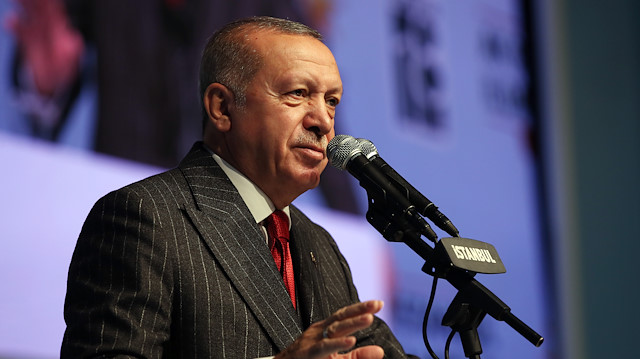
Turkey’s maritime boundary delimitation agreement with Libya was sent to the United Nations, President Recep Tayyip Erdogan said on Saturday.
Speaking at the ruling Justice and Development (AK) Party's consultation meeting of provincial heads at Halic Congress Center in Istanbul, Erdoğan stressed that Turkey will continue to maintain its determined stance with Libya.
"Turkey will use its rights under international law and international maritime law till the end on Eastern Mediterranean" he added.
Turkey called on the regional countries to work in a collective manner regarding the distribution of hydrocarbon reserves, which have an estimated value of hundreds of billions of dollars and turn the natural sources into an opportunity to boost bilateral ties and neighboring relations.
However, Ankara’s calls have fallen on deaf ears so far and some countries attempted to isolate Turkey from the energy equation. Turkey maintains drilling activities in the Mediterranean region under escort of the country’s navy elements.
Erdoğan also condemned Greece's decision to expel the Libyan ambassador in response to the accord between Libya and Turkey, saying: "It demonstrates poor diplomatic conduct."
A recently signed pact between Turkey and Libya laying out the two countries’ maritime boundaries in the eastern Mediterranean was published in the country's Official Gazette on Saturday.
The Turkish parlisment ratified a the pact on Thursday.
On Nov. 27, Turkey and Libya’s Tripoli-based Government of National Accord (GNA) signed the bilateral memorandum.
The memorandum asserts Turkey’s rights in the Eastern Mediterranean in the face of unilateral drilling by the Greek Cypriot administration, clarifying that the Turkish Republic of Northern Cyprus (TRNC) also has rights to the resources in the area.
Turkish president went on to say that Turkey would not leave Syria unless foreign countries withdraw from the region or Syrian people demand the country's leave.
Turkey on Oct. 9 launched Operation Peace Spring to eliminate YPG/PKK terrorists from northern Syria east of the Euphrates River in order to secure Turkey’s borders, aid in the safe return of Syrian refugees, and ensure Syria’s territorial integrity.
Under two separate deals with the U.S. and Russia, Turkey paused the operation to allow the withdrawal of YPG/PKK terrorists from the planned Syria safe zone.
Prior to this, Turkey led two successful operations, Olive Branch and Euphrates Shield, in northern Syria to rid the region of terrorists.
In its more than 30-year terror campaign against Turkey, the PKK -- listed as a terrorist organization by Turkey, the U.S. and EU -- has been responsible for the deaths of nearly 40,000 people, including women, children, and infants. The YPG is the PKK's Syrian offshoot.


